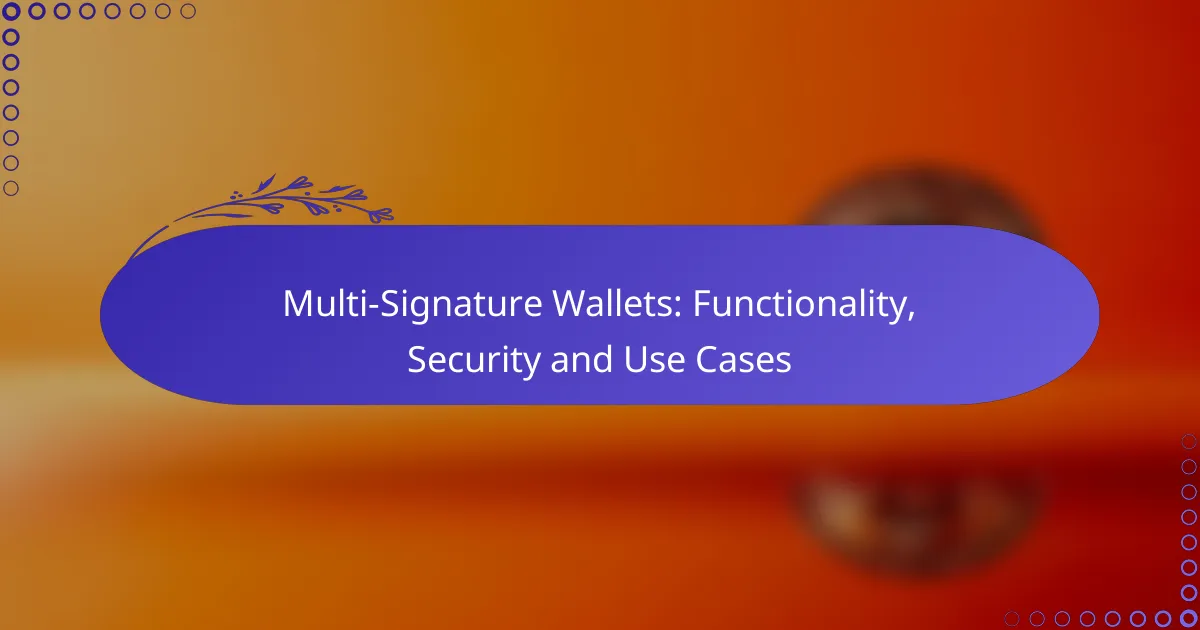Multi-signature wallets provide an advanced layer of security by requiring multiple private keys to authorize transactions, significantly reducing the risk of unauthorized access. These wallets are particularly useful in scenarios where shared control of digital assets is necessary, allowing multiple parties to collaborate while enhancing protection against theft and fraud.
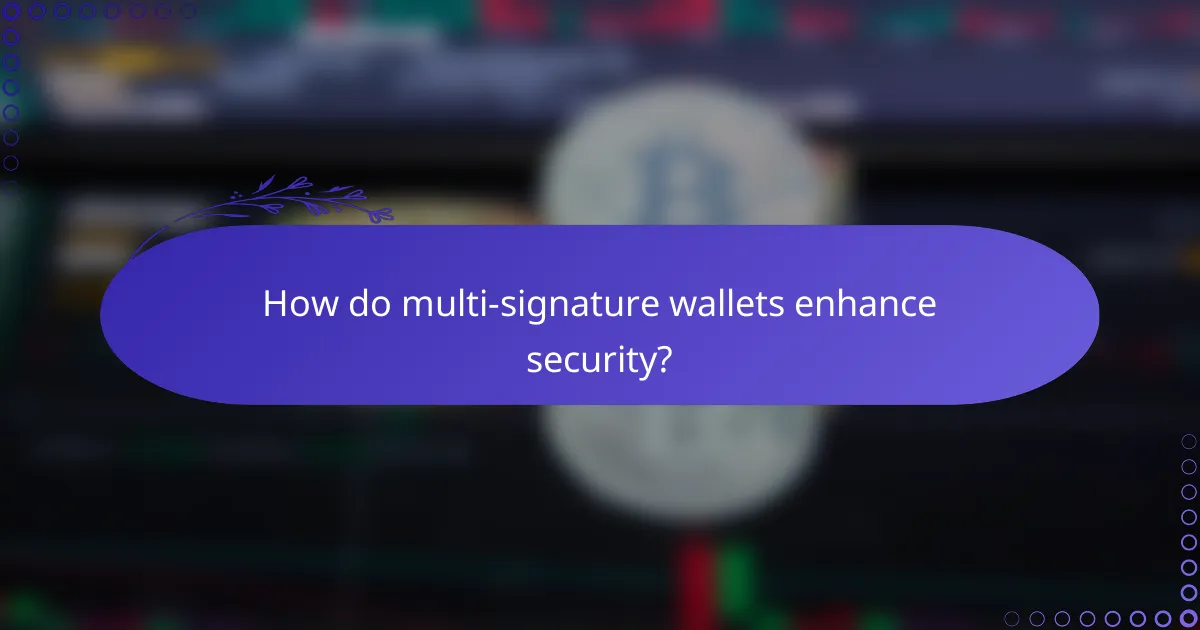
How do multi-signature wallets enhance security?
Multi-signature wallets enhance security by requiring multiple private keys to authorize a transaction, making unauthorized access significantly more difficult. This layered approach to security helps protect assets from theft and fraud.
Protection against unauthorized access
Multi-signature wallets require multiple signatures from different private keys for transaction approval, which adds a robust layer of protection against unauthorized access. For example, if a wallet is set to require three out of five signatures, an attacker would need to compromise three separate keys to gain access, making it highly unlikely.
This is particularly useful for organizations or groups managing shared funds, as it ensures that no single individual can unilaterally access or transfer the assets without consensus.
Reduction of single points of failure
By distributing control across multiple keys, multi-signature wallets reduce the risk associated with single points of failure. If one key is lost or compromised, the funds remain secure as long as the required number of remaining keys is intact.
This setup is beneficial for businesses and individuals alike, as it mitigates the risks associated with losing access to a single private key, which can happen due to theft, loss, or technical issues.
Enhanced transaction verification
Multi-signature wallets improve transaction verification by requiring multiple approvals before a transaction can be executed. This process not only adds security but also encourages collaboration and oversight among users involved in managing the wallet.
For example, in a corporate setting, a transaction might require approval from the finance team and the legal department, ensuring that all necessary checks are performed before funds are moved. This collective verification process helps prevent errors and fraudulent activities.
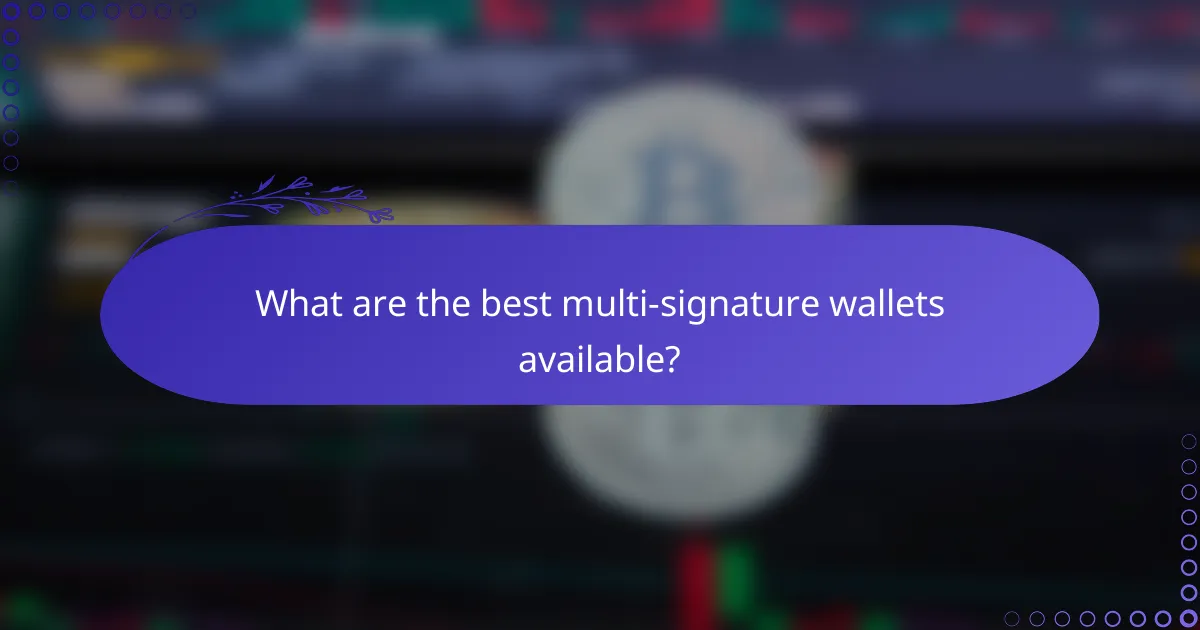
What are the best multi-signature wallets available?
The best multi-signature wallets combine security, functionality, and user experience. They allow multiple parties to authorize transactions, enhancing protection against unauthorized access and fraud.
BitGo
BitGo is a well-established multi-signature wallet known for its robust security features and enterprise-level solutions. It supports various cryptocurrencies and offers features like hot and cold storage options, ensuring that assets are safeguarded against theft.
Users can set up multi-signature wallets with customizable signing requirements, such as needing two out of three signatures for a transaction. This flexibility makes BitGo suitable for both individual and institutional users.
Gnosis Safe
Gnosis Safe is a popular choice for managing digital assets with a focus on decentralized finance (DeFi). It provides a user-friendly interface and supports Ethereum-based tokens, making it ideal for users involved in the Ethereum ecosystem.
With Gnosis Safe, users can create wallets that require multiple signatures for transactions, enhancing security. It also integrates with various DeFi applications, allowing for seamless asset management and interaction with decentralized protocols.
Casa
Casa specializes in providing a secure multi-signature wallet experience, particularly for Bitcoin users. Its unique approach involves a combination of hardware and software solutions, ensuring that private keys are stored securely across multiple devices.
Casa offers a tiered membership model, allowing users to choose the level of security and features they need. This includes options for personal use or family setups, making it a versatile choice for safeguarding Bitcoin holdings.
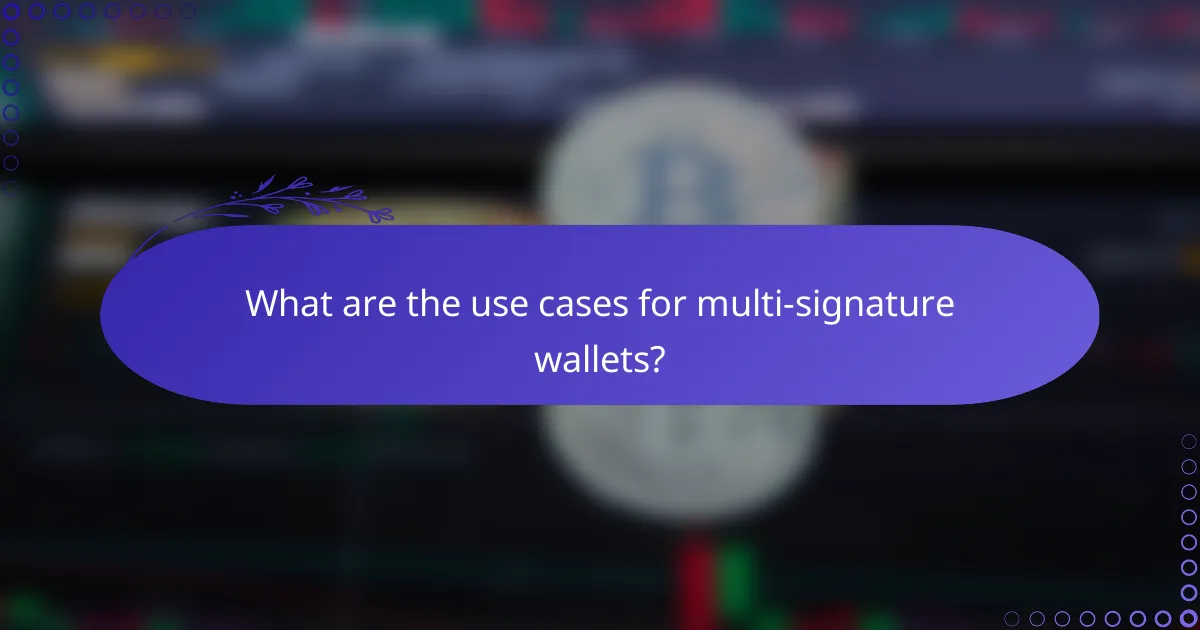
What are the use cases for multi-signature wallets?
Multi-signature wallets serve various purposes, enhancing security and collaboration in managing digital assets. They require multiple private keys to authorize transactions, making them ideal for shared control scenarios.
Corporate treasury management
In corporate treasury management, multi-signature wallets provide a secure way for companies to manage their funds. By requiring approvals from multiple executives or board members, organizations can prevent unauthorized transactions and enhance accountability.
For example, a company might set up a wallet that requires signatures from the CFO and another executive for any transaction over a certain amount, such as $10,000. This ensures that significant financial decisions are made collectively.
Joint accounts for families
Families can use multi-signature wallets to manage shared assets, such as savings for a vacation or a child’s education. By requiring multiple signatures, family members can collaboratively control spending and savings, fostering transparency and trust.
For instance, a family might create a wallet that requires signatures from both parents for any withdrawal, ensuring that both parties agree on financial decisions. This can help avoid disputes and encourage joint financial planning.
Escrow services for transactions
Multi-signature wallets are ideal for escrow services, where funds are held until certain conditions are met. By requiring signatures from both the buyer and seller, these wallets ensure that neither party can access the funds without mutual consent.
For example, in a real estate transaction, a multi-signature wallet can hold the deposit until all contractual obligations are fulfilled. This adds a layer of security and trust, reducing the risk of fraud in high-value transactions.
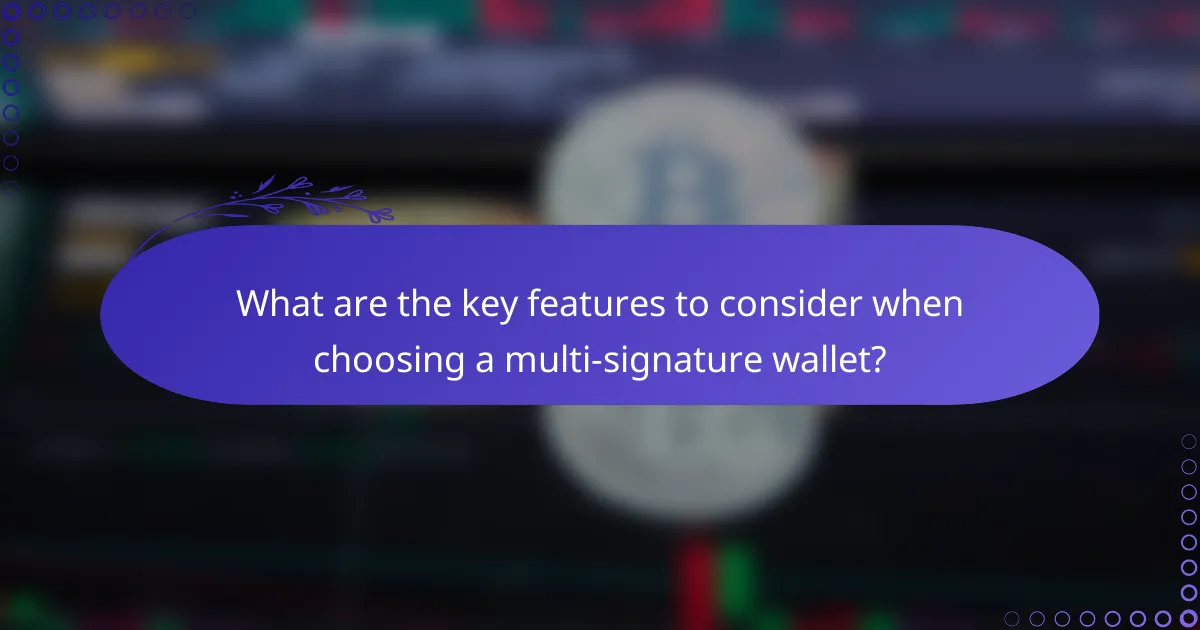
What are the key features to consider when choosing a multi-signature wallet?
When selecting a multi-signature wallet, consider factors such as supported cryptocurrencies, user interface, and integration with other services. These features significantly impact usability, security, and the overall effectiveness of the wallet in managing digital assets.
Supported cryptocurrencies
Different multi-signature wallets support varying cryptocurrencies, which can influence your choice. Ensure the wallet you select supports the specific digital currencies you intend to manage, such as Bitcoin, Ethereum, or others.
Some wallets may focus on popular coins, while others might offer support for a broader range of altcoins. Check the wallet’s official documentation or website for a comprehensive list of supported cryptocurrencies.
User interface and experience
A user-friendly interface is crucial for effectively managing a multi-signature wallet. Look for wallets that offer intuitive navigation, clear instructions, and easy access to key features like transaction history and settings.
Consider testing the wallet’s interface through a demo or trial version, if available. This can help you gauge the overall user experience and ensure it aligns with your preferences and technical comfort level.
Integration with other services
Integration capabilities can enhance the functionality of a multi-signature wallet. Check if the wallet can connect with exchanges, payment processors, or other financial services you use, as this can streamline transactions and asset management.
Some wallets may offer APIs or plugins for seamless integration, while others might have limited connectivity options. Evaluate how well the wallet integrates with your existing tools to ensure a smooth workflow.
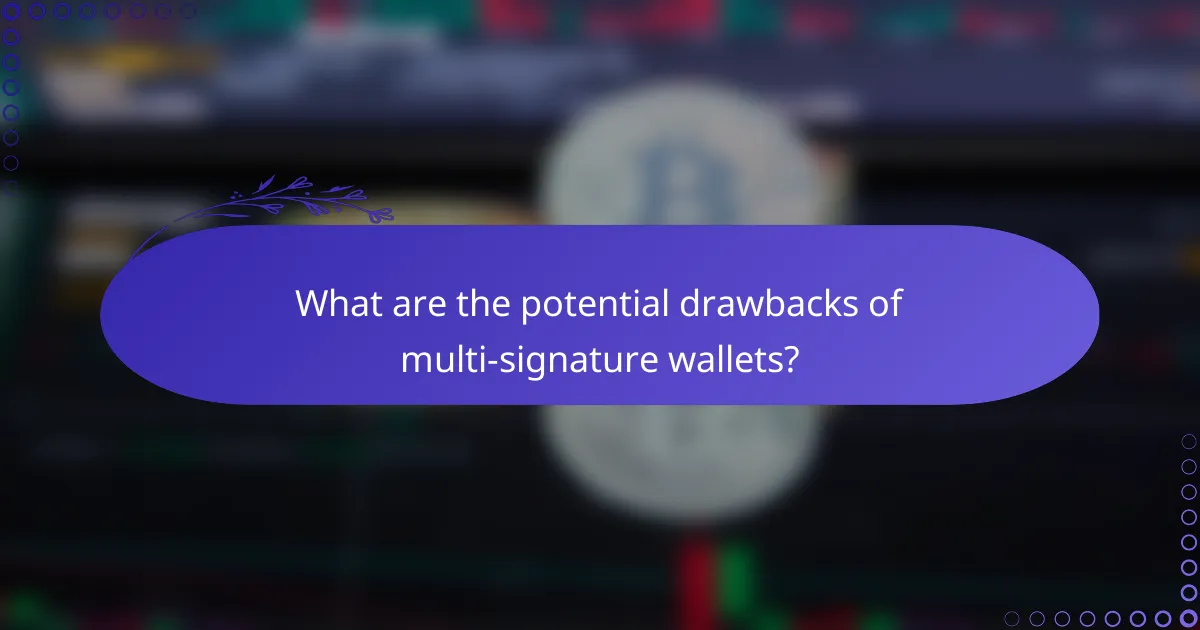
What are the potential drawbacks of multi-signature wallets?
Multi-signature wallets offer enhanced security but come with several potential drawbacks that users should consider. These include complexity in setup, higher transaction fees, and dependency on multiple parties for access and management.
Complexity in setup
Setting up a multi-signature wallet can be significantly more complex than a standard wallet. Users must configure multiple keys and establish the rules for how many signatures are required for transactions, which can be daunting for those unfamiliar with the technology.
This complexity can lead to mistakes during setup, such as misconfiguring the required signatures, which may result in lost access to funds. It’s advisable to follow detailed guides or seek assistance from knowledgeable individuals when setting up these wallets.
Higher transaction fees
Multi-signature transactions often incur higher fees compared to standard transactions. This is primarily due to the additional data required to process multiple signatures on the blockchain, which can increase the overall transaction size.
Users should be prepared for these additional costs, especially if they frequently conduct transactions. It may be beneficial to evaluate the cost-effectiveness of using a multi-signature wallet versus a standard wallet based on individual transaction needs.
Dependency on multiple parties
Multi-signature wallets require cooperation among multiple parties, which can lead to complications if one party is unavailable or unresponsive. For example, if a key holder loses access to their key or is unreachable, it may delay or prevent transactions.
To mitigate this risk, it’s crucial to establish clear communication and trust among all parties involved. Additionally, consider having a contingency plan in place, such as designating backup key holders, to ensure continued access to the wallet.
